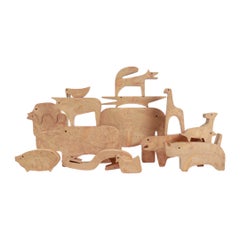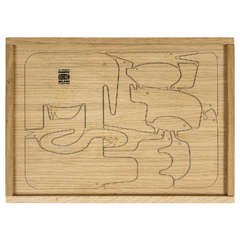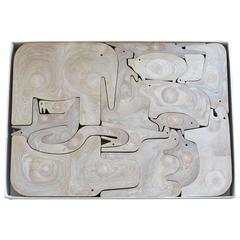Enzo Mari Animali
Vintage 1970s Italian Mid-Century Modern Games
Resin
Recent Sales
Vintage 1950s Italian Games
Mid-20th Century Italian Mid-Century Modern Animal Sculptures
21st Century and Contemporary Italian Modern Toys
Oak
Vintage 1970s Italian Mid-Century Modern Toys
Resin
Vintage 1970s Art Nouveau Games
Resin
1990s Italian Modern Toys
Wood
Vintage 1960s Italian Mid-Century Modern Games
People Also Browsed
1990s Italian Mid-Century Modern Chairs
Steel
Vintage 1960s Italian Mid-Century Modern Vases
Murano Glass
21st Century and Contemporary Indonesian Side Tables
Rattan
Vintage 1940s French Mid-Century Modern Chandeliers and Pendants
Metal
21st Century and Contemporary Portuguese Modern Table Lamps
Ceramic, Clay
Vintage 1950s French Mid-Century Modern Console Tables
Metal
Vintage 1950s Italian Dressers
Iron
Mid-20th Century Italian Mid-Century Modern Table Lamps
Ceramic, Plastic
Mid-20th Century American Mid-Century Modern Coffee and Cocktail Tables
Aluminum, Steel, Chrome
Vintage 1960s Italian Mid-Century Modern Dining Room Chairs
Metal
Vintage 1930s Swedish Art Deco Sofas
Fabric, Wood
Early 20th Century Austrian Art Deco Vases
Brass
Vintage 1960s Italian Mid-Century Modern Umbrella Stands
Enamel, Stainless Steel
21st Century and Contemporary French Mid-Century Modern Side Tables
Metal
Mid-20th Century Japanese Mid-Century Modern Lanterns
Metal
Antique 16th Century French Gothic Cabinets
Wrought Iron
Enzo Mari for sale on 1stDibs
Enzo Mari was an influential industrial designer and a beloved curmudgeon who revered Marxism. His vintage mid-century modern designs are simple, functional and poetic. Widely known Mari-designed objects include desk accessories, such as the Formosa perpetual wall calendar, vases, cocktail tables and chandeliers.
Enzo Mari's work is embedded within the city of Milan, the Italian capital of all things design. In fact, the traffic bollards he devised are part of the city itself: Shaped like "panettone" cakes, they simultaneously direct traffic and provide seating for pedestrians.
In 1974, Mari published Autoprogettazione? (roughly translated as self-design), a Marx-inspired, anti-industrial, do-it-yourself handbook for the everyday person to use to build furniture without the assistance of a glitzy designer or knowledge of complex joinery. Mari’s intent with the publication was to remove the alienation of the creator and manufacturer from the end product by teaching anyone to develop a critical eye for production.
Artek relaunched kits based on the blueprints in the manual in an exhibition at Spazio Rossana Orlandi in 2010. The subsequent collectability of his work was reportedly irksome for Mari because he abhorred the industrial production for which he was becoming known.
Mari’s meager upbringing heavily influenced his politics, and even in childhood, he would come up with ingenious ways to support the family financially. As a designer, the desire to envision and build significant pieces was more important to Mari than devising new marketing and retail sales tactics. He optimistically believed objects could change the world. This view went against the rising consumer mania for every next trend that surfaced in the late 20th century. Not surprisingly, his ecological and economical stance led him to produce fewer objects.
Mari's philosophy did not stop people from desiring his creations, nor prevent other designers from wanting to collaborate with him. Following World War II, he worked for companies like Danese, Olivetti, Artemide, Driade and Alessi, who brought his prodigious designs to the public, and Mari’s work was widely celebrated.
The Golden Compass, Italy's highest honor for industrial design, was awarded to Mari four times before he died from COVID in 2020, and New York’s Museum of Modern Art has a permanent collection of his objects on display.
On 1stDibs, find a collection of Enzo Mari decorative objects, folk art and serveware.


